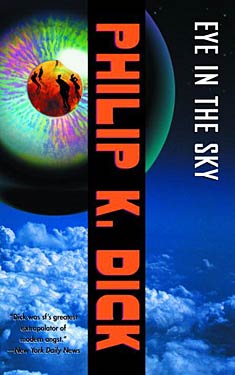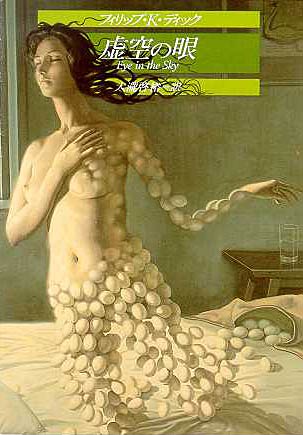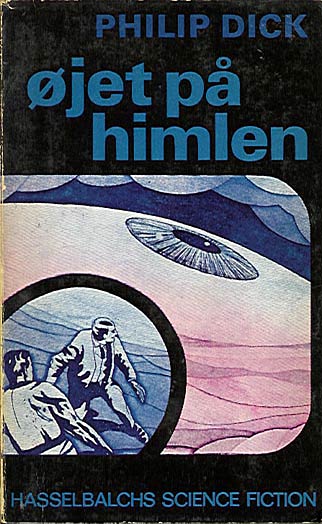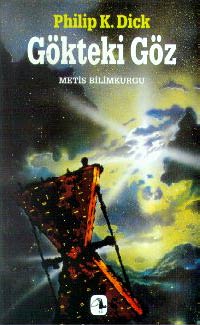
Added By: Administrator
Last Updated: gallyangel
Eye in the Sky
Synopsis
While sightseeing at the Belmont Bevatron, Jack Hamilton, along with seven others, is caught in a lab accident. When he regains consciousness, he is in a fantasy world of Old Testament morality gone awry-a place of instant plagues, immediate damnations, and death to all perceived infidels. Hamilton figures out how he and his compatriots can escape this world and return to their own, but first they must pass through three other vividly fantastical worlds, each more perilous and hilarious than the one before.
Winner of both the Hugo and John W. Campbell awards for best novel, widely regarded as the premiere science fiction writer of his day, and the object of cult-like adoration from his legions of fans, Philip K. Dick has come to be seen in a literary light that defies classification in much the same way as Borges and Calvino. With breathtaking insight, he utilizes vividly unfamiliar worlds to evoke the hauntingly and hilariously familiar in our society and ourselves.
Excerpt
ONE
The proton beam deflector of the Belmont Bevatron betrayed its inventors at four o'clock in the afternoon of October 2, 1959. What happened next happened instantly. No longer adequately deflected--and therefore no longer under control--the six billion volt beam radiated upward toward the roof of the chamber, incinerating, along its way, an observation platform overlooking the doughnut-shaped magnet.
There were eight people standing on the platform at the time: a group of sightseers and their guide. Deprived of their platform, the eight persons fell to the floor of the Bevatron chamber and lay in a state of injury and shock until the magnetic field had been drained and the hard radiation partially neutralized.
Of the eight, four required hospitalization. Two, less severely burned, remained for indefinite observation. The remaining two were examined, treated, and then released. Local newspapers in San Francisco and Oakland reported the event. Lawyers for the victims drew up the beginnings of lawsuits. Several officials connected with the Bevatron landed on the scrap heap, along with the Wilcox-Jones Deflection System and its enthusiastic inventors. Workmen appeared and began repairing the physical damage.
The incident had taken only a few moments. At 4:00 the faulty deflection had begun, and at 4:02 eight people had plunged sixty feet through the fantastically charged proton beam as it radiated from the circular internal chamber of the magnet. The guide, a young Negro, fell first and was the first to strike the floor of the chamber. The last to fall was a young technician from the nearby guided missile plant. As the group had been led out onto the platform he had broken away from his companions, turned back toward the hallway and fumbled in his pocket for his cigarettes.
Probably if he hadn't leaped forward to grab for his wife, he wouldn't have gone with the rest. That was the last clear memory: dropping his cigarettes and groping futilely to catch hold of Marsha's fluttering, drifting coat sleeve....
All morning Hamilton sat in the missile research labs, doing nothing but sharpening pencils and sweating worry. Around him his staff continued their work; the corporation went on. At noon Marsha showed up, radiant and lovely, as sleekly dressed as one of the tame ducks in Golden Gate Park. Momentarily, he was roused from his brooding lethargy by the sweet-smelling and very expensive little creature he had managed to snare, a possession even more appreciated than his hi-fi rig and his collection of good whiskey.
"What's the matter?" Marsha asked, perching briefly on the end of his gray metal desk, gloved fingers pressed together, slim legs restlessly twinkling. "Let's hurry and eat so we can get over there. This is the first day they have that deflector working, that part you wanted to see. Had you forgotten? Are you ready?"
"I'm ready for the gas chamber," Hamilton told her bluntly. "And it's about ready for me."
Marsha's brown eyes grew large; her animation took on a dramatic, serious tone. "What is it? More secret stuff you can't talk about? Darling, you didn't tell me something important was happening today. At breakfast you were kidding and frisking around like a puppy.
"I didn't know at breakfast." Examining his wristwatch, Hamilton got gloomily to his feet. "Let's make it a good meal; it may be my last." He added, "And this may be the last sight-seeing trip I'll ever take."
But he didn't reach the exit ramp of the California Maintenance Labs, let alone the restaurant down the road beyond the patrolled area of buildings and installations. A uniformed messenger stopped him, a tab of white paper folded neatly and extended. "Mr. Hamilton, this is for you. Colonel T. E. Edwards asked me to give it to you."
Shakily, Hamilton unraveled it. "Well," he said mildly to his wife, "this is it. Go sit in the lounge. If I'm not out in an hour or so, go on home and open a can of pork and beans."
"But--" She gestured helplessly. "You sound so--so dire. Do you know what it is?"
He knew what it was. Leaning forward, he kissed her briefly on her red, moist and rather frightened lips. Then, striding rapidly down the corridor after the messenger, he headed for Colonel Edwards's suite of offices, the high-level conference rooms where the big brass of the corporation were sitting in solemn session.
As he seated himself, the thick, opaque presence of middle-aged businessmen billowed up around him: a compound of cigar smoke, deodorant, and black shoe polish. A constant mutter drifted around the long steel conference table. At one end sat old T. E. himself, fortified by a mighty heap of forms and reports. To some degree, each official had his mound of protective papers, opened briefcase, ashtray, glass of tepid water. Across from Colonel Edwards sat the squat, uniformed figure of Charley McFeyffe, captain of the security cops who prowled around the missile plant, screening out Russian agents.
"There you are," Colonel T. E. Edwards murmured, glancing sternly over his glasses at Hamilton. "This won't take long, Jack. There's just this one item on the conference agenda; you won't have to sit through anything else."
Hamilton said nothing. Tautly, with a strained expression, he sat waiting.
"This is about your wife," Edwards began, licking his fat thumb and leafing through a report. "Now, I understand that since Sutherland resigned, you've been in full charge of our research labs. Right?"
Hamilton nodded. On the table, his hands had visibly faded to a stark, bloodless white. As if he were already dead, he thought wryly. As if he were already hanging by the neck, squeezed out from all life and sunshine. Hanging, like one of Hormel's hams, in the dark sanctity of the abattoir.
"Your wife," Edwards rumbled ponderously on, his liver-spotted wrists rising and falling as he flipped pages, "has been classified as a plant security risk. I have the report here." He nodded toward the silent captain of the plant police. "McFeyffe brought it to me. I should add, reluctantly."
"Reluctantly as hell," McFeyffe put in, directly to Hamilton. His gray, hard eyes begged to apologize. Stonily, Hamilton ignored him.
"You, of course," Edwards rambled on, "are familiar with the security setup here. We're a private concern, but our customer is the government. Nobody buys missiles but Uncle Sam. So we have to watch ourselves. I'm bringing this to your attention so you can handle it in your own way. Primarily, it's your concern. It's only important to us in that you head our research labs. That makes it our business." He eyed Hamilton as if he had never set eyes on him before--in spite of the fact that he had originally hired him in 1949, ten solid years ago, when Hamilton was a young, bright, eager electronics engineer, just bursting out of MIT.
"Does this mean," Hamilton asked huskily, watching his two hands clench and unclench convulsively, "that Marsha is barred from the plant?"
"No," Edwards answered, "it means you will be denied access to classified material until the situation alters."
"But that means..." Hamilton heard his voice fade off into astonished silence. "That means all the material I work with."
Nobody answered. The roomful of company officials sat fortified by their briefcases and mounds of forms. Off in a corner, the air conditioner struggled tinnily.
"I'll be goddammed," Hamilton said suddenly, in a very loud, clear voice. A few forms rattled in surprise. Edwards regarded him sideways, with curiosity. Charley McFeyffe lit a cigar and nervously ran a heavy hand through his thinning hair. He looked, in his plain brown uniform, like a potbellied highway patrolman.
"Give him the charges," McFeyffe said. "Give him a chance to fight back, T. E. He's got some rights."
For an interval Colonel Edwards fought it out with the massed data of the security report. Then, his face darkening with exasperation, he shoved the whole affair across the table to McFeyffe. "Your department drew it up," he muttered, washing his hands of the matter. "You tell him."
"You mean you're going to read it here?" Hamilton protested. "In front of thirty people? In the presence of every official of the company?"
"They've all seen the report," Edwards said, not unkindly. "It was drawn up a month or so ago and it's been circulating since then. After all, my boy, you're an important man here. We wouldn't take up this matter lightly."
"First," McFeyffe said, obviously embarrassed, "we have this business from the FBI. It was forwarded to us."
"You requested it?" Hamilton inquired acidly. "Or did it just happen to be circulating back and forth across the country?"
McFeyffe colored. "Well, we sort of asked for it. As a routine inquiry. My God, Jack, there's a file on me--there's even a file on President Nixon."
"You don't have to read all that junk," Hamilton said, his voice shaking. "Marsha joined the Progressive Party back in '48 when she was a freshman in college. She contributed money to the Spanish Refugee Appeals Committee. She subscribed to In Fact. I've heard all that stuff before."
"Read the current material," Edwards instructed.
Picking his way carefully through the report, McFeyffe found the current material. "Mrs. Hamilton left the Progressive Party in 1950. In Fact is no longer published. In 1952 she attended meetings of the California Arts, Sciences, and Professions, a front organization with pro-Communist leanings. She signed the Stockholm Peace Proposal. She joined the...
Copyright © 1957 by Philip K. Dick
Reviews
Images









































 Full Details
Full Details






